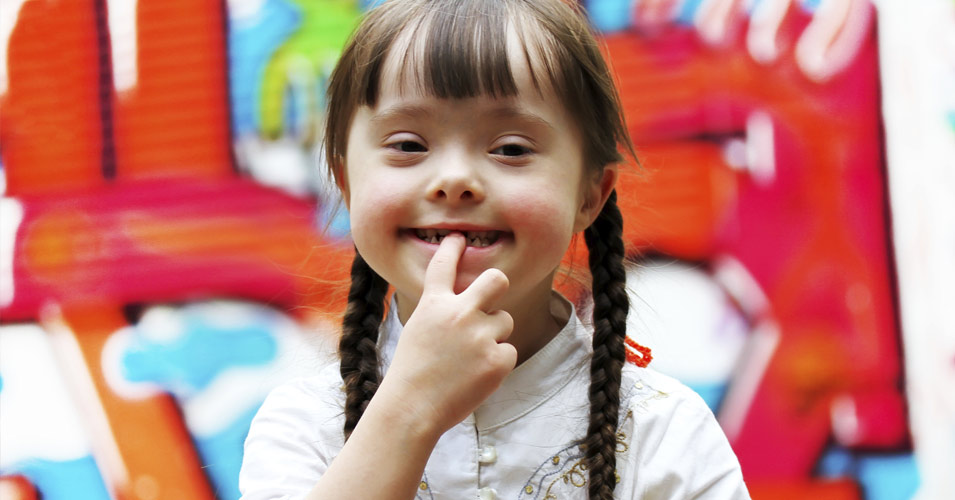I walked home after waving goodbye to my daughter, Amanda, on her first day of kindergarten. I was thankful for the sunglasses that hid tears in my eyes. She was my first child and for the first time entering a world completely separate from me.
Kindergarten: where each child is a shiny, clean slate on which teachers can write knowledge and experience.
The tears in my eyes were partly for the loss of babyhood. For the sweet, cozy world that had been just ours. But the tears were also because I knew my child was not a clean slate. I knew teachers had already determined there were skills they felt she could not master.
Before Amanda’s first day of school there had been meetings, assessments, evaluations and views shared about her. She has Down syndrome and, at the time she entered kindergarten, also a had tracheostomy tube to assist with breathing.
It was the double whammy: cognitive challenges and the need for medical support. There was no way we were arriving day one of kindergarten without advance notice, planning and supports in place.
While I understood the preparation was necessary, it hurt my heart. She was not being given the same opportunity to prove herself that all the other kindergartners had.
I wanted to sit with the teachers and explain. I wanted them to know I wasn’t expecting a miracle. I understood that no amount of teaching skill could make my child’s special needs evaporate.
And I wanted them look beyond the delays or perceived shortcomings. I hoped they would understand that Amanda’s presence in the classroom could introduce opportunities for lessons in compassion and empathy on the part of her classmates. That alternative and creative teaching methods employed to help Amanda would also benefit other students.
I wanted to beg: Please see the possible. Please give her time. Please let her try.
And please know that what I want most is for Amanda to have a positive school experience. That she feels included. That she contributes. That she feels successful.
But I was afraid. Afraid the teacher would be thinking, “Yup, here is another parent in denial regarding their child’s disability.” Or worse yet, that she would give me that I-don’t-have-time-for-this face.
I walked home that morning and prayed for the best.
I have wondered throughout the years if my saying something would have made a teacher stop for a moment and possibly rethink her or his approach. Might my imagined discussion have affected the year ahead for my daughter? Could my words have prompted a positive classroom experience?
I wanted to get the views of other parents of children with special needs as the new school year approached, so I interviewed them in a series of email exchanges.
Corresponding with Ally Donofrio, whose daughter Addison is entering kindergarten this fall, I realized that my hopes so many years ago are still being felt today.
When asked what she would love to tell Addison’s teachers, Ally wrote, “I want her to be treated as any other student, with respect and with the bar set high from the start. My goal is that she should continue to grow and learn just as she has to this point. She’s a kindergarten student, just like all the other 5- and 6-year-olds with their futures open and ready to be molded.”
Colleen Brennan Leal wishes teachers would look beyond scores. “Our children are not defined by state tests. My son Paul is more than a 3 or a 4 on a state test. In middle school he had the capacity to carry on conversations with adults and not be awkward. He advocates for himself, is inquisitive, has compassion and loves everyone. He wakes up with a smile on his face every morning and sees what is right with the world. Now that’s a 4 in my book.”
Lisa Burt’s daughter Michaela, who is heading into seventh grade, was recently diagnosed with type 1 diabetes. What does Lisa think about? “As long as we communicate, we will care for my daughter and the staff will know what to do to prevent a situation from escalating. Just because she looks fine does not mean the situation is not serious. Listening to my daughter and her needs is crucial.”
George Catalano Sr.’s son George Jr. is going into 11th grade. George Sr. wrote: “I actually just want my son to have an enjoyable school experience. I want him to keep learning, his teachers to continue having him be part of the group, and for him to get recognition for his accomplishments.”
That’s what these parents are hoping for as they send their kids off to school. They want their children to be challenged, but with appropriate expectations. They do not want their kids to be defined by a score on a test; they wish for open communication with teachers. And these parents long for their children to be included, recognized and happy.
Not miracles. Not extraordinary feats. Not the impossible.
These are the things I wish Amanda’s teachers had heard before that first day in kindergarten and every year since. Do all parents feel this way? I am betting so, special needs or not.



